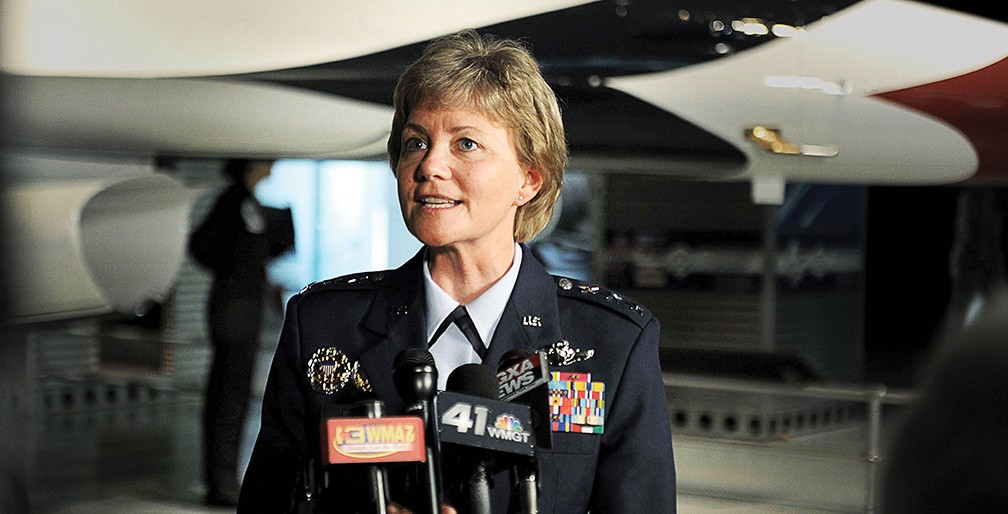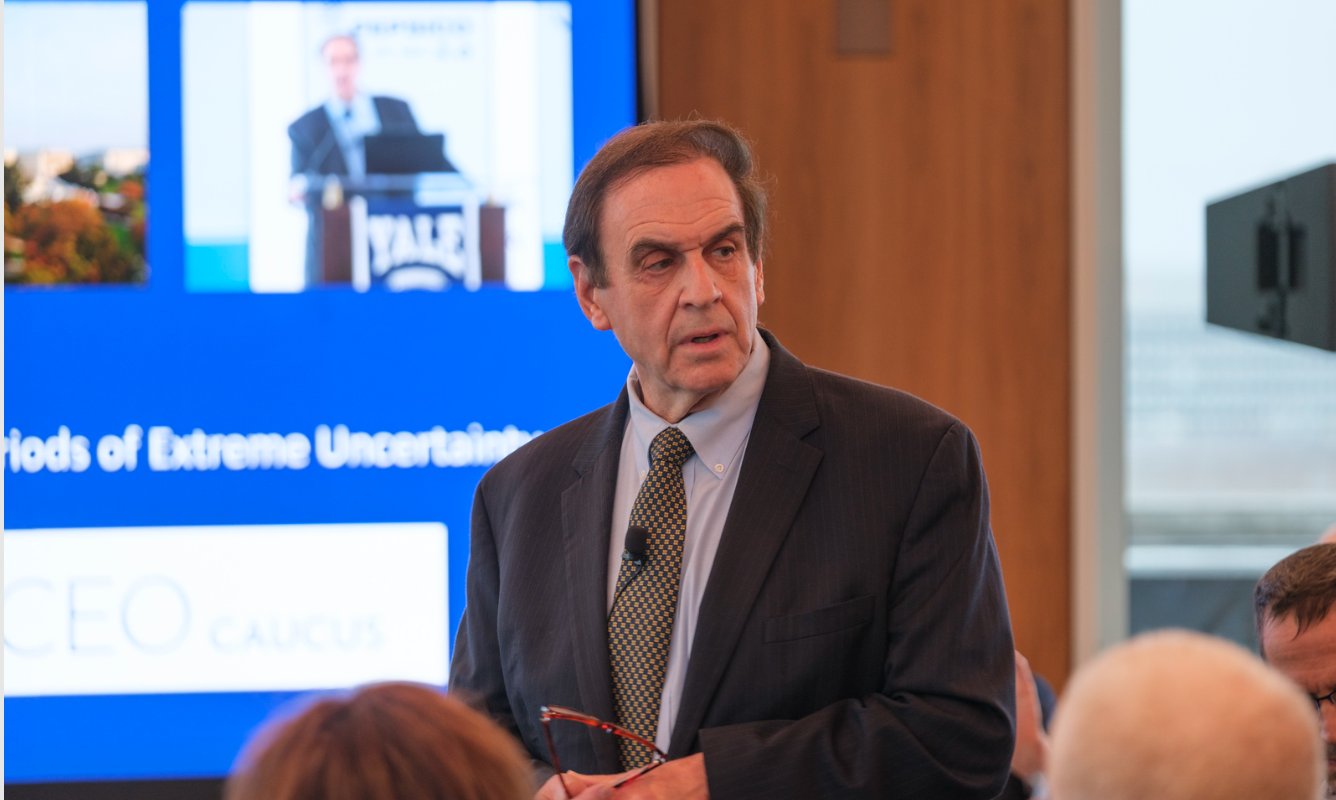Heart and Humility
In early September 2001, then Lt. Col. Maryanne Miller had decided to retire after 20 years with the U.S. Air Force. Then 9/11 happened. “It changed the world for me,” she said in a 2019 profile on NBC’s Today. “I called and said, ‘Pull my retirement paperwork. I want to stay.’” Retirement could wait—for 19 more years, it turns out. The call to duty had sounded again.
Having distinguished herself with every assignment, she became the first woman to serve as chief of the Air Force Reserve. As a command pilot, she logged nearly 5,000 flight hours in various aircraft, including the massive C-17 Globemaster III. In 2018, she became a four-star general—and for nearly two years was the only female four-star officer in any branch of the U.S. military.
Until very recently, Gen. Miller was commander of Air Mobility Command (AMC) at Scott Air Force Base in Illinois. AMC’s role, carried out by some 106,000 military and civilian personnel with the aid of a $15 billion budget, provides rapid, global mobility and sustainment for America’s armed forces. It also supplies humanitarian support during natural disasters.
“We have airplanes taking off every three minutes, every day of every year,” says Gen. Miller. “To our enemies, we are the wings of strength; to our friends, we are the wings of hope.” As head of AMC, the general also managed Air Force One and other aircraft that carry members of Congress.
Although plenty of well-deserved attention comes with that rare fourth star, the Ohio native is quick to defer to the Air Force’s rank and file. “It’s never about us. It’s always about them,” she said in the Today segment. Asked what shaped her down-to-earth personality, she replied, “I think connecting with people. I tell our young airmen, ‘You really need to be good at what you do, and you really need to be a good person.’ I spend a lot of time on their heart. You can be a technical expert all day, but when that goes away, who are you? It’s what you have inside.”
In this interview—one of her last before her retirement, effective October 1, 2020—Gen. Miller discusses leadership and the challenges posed by a rapidly changing world.
Insigniam Quarterly: Why did you choose a military career—specifically, the Air Force?
Gen. Miller: I had no intention of going into the military. I was a scholarship athlete [softball] at Ohio State University, and we had to work out all the time. I always ended up sitting next to this young man on the weight machines. He had really short hair, and we just got to talking. He said, “Hey, you want to come over and see the ROTC building?”
I had no idea what Reserve Officers’ Training Corps was. He was both an athlete and in Air Force ROTC, and he talked about how being on an athletic team and being on an Air Force team were a lot alike. We were focused on a mission; we were service-minded and always wanted to win. We cared about doing things right. It was a group of people that I just clicked with.
IQ: Was “General” ever on your career radar?
Gen. Miller: No, not at all. And I think if you asked other four-star generals, many of them would say that way back in the beginning of their careers, that was not on their radar either. It was really just “give it your all” and be the best person you could be. I think that’s what we were all pursuing, and those are the kinds of people I hung around with. I never actually went after a job. I literally just did the best I could, and people would seek me out and say, “Let’s try this next, and let’s go here next.” So I never asked for a job. I got offered jobs.
IQ: Are there parallels between being a four-star general and being the CEO of a major corporation? What advice or lessons can a top business executive learn from someone like you?
Gen. Miller: I think executives know the balance between mission and people. You have to be an expert in both. People make your organization and your culture. You’ve got to have a vision of where your company is going. You need to progress in the mission every day, and you need to develop people with opportunities to grow and build character.—Gen. Maryanne Miller Share on XThat’s an area within the Air Force that we are really focusing on now.
“I never actually went after a job. I just did the best I could, and people would seek me out and say, ‘Let’s try this next, and let’s go here next.’ So I never asked for a job. I got offered jobs.” —Gen. Maryanne Miller
Given the social unrest around the country, I think every organization, every company, every town is looking in the mirror and asking, “Have we done enough to develop character?” We’re in exactly that same spot. The thing that I would pass on—and I think any CEO understands this—is a focus on our vocations. As a CEO, you’ve got to give that job, that vocation, just as much of yourself, of your character and of your competence as you give everything else. I like to talk about magnanimity and humility. Magnanimity is always seeking to be great. And it’s not always great things. It’s not a seven-figure bank account. It’s how you strive to be good in everything you take on. Over the past few years, I’ve looked in many leadership books and tried to find the word “humility.” It’s not there. Humility is the key to so much of our lives. It’s always putting others first. Because it’s never about ourselves.
IQ: Are the essential skills that you must have to succeed still evolving, or has there been more continuity than change in your career?
Gen. Miller: When I was young, it was constantly changing because your character development is a choice you make. You choose to do it, or you choose not to do it. It was always “I, I, I.” I’m one of the first female pilots. I’m this. I’m that. And that doesn’t get you anywhere. It’s alienating. That’s not how you take your gifts and help others, whatever those gifts are. Over the years, this realization has come through owning a restaurant and understanding that every patron has a story. Stories are our lives. When you can share your story, people grow through that. And I grew through listening to the stories of the patrons.
That’s when I started really learning about people and putting people before myself. And that led me to working with Mother Teresa’s Missionaries of Charity. Your heart starts to grow; then, your life changes. You can still climb to the highest heights of any company, but along the way, your heart is growing because you just view the world differently.
IQ: With the military’s structure and chain of command, do you have the freedom to innovate as needed in order to get the job done? Is there an example of you or others being innovative?
Gen. Miller: We spend a lot of time with our airmen as we bring them in, talking a lot about rules and regulations and policies. “By God, airman, you stay on this path, and this will keep you out of trouble.” But we also say, “You know what? I need to unleash your thoughts. You’re bound by being a part of this culture, but don’t be bound in your thinking. No matter what your job is, I need you to come in every day and put that critical eye on everything you do. I don’t need you to be critical; I need you to be a critical thinker. And I need you to move the mission forward.” That’s what we try to instill in our airmen. And we’ve innovated a lot over the past few years. In fact, it was one of my priorities for the command when I took over: innovation for our future.
One small example of how to think differently? Before coming into the Air Force, Senior Airman John Cuttito of Miami, Florida, was an auto mechanic. He used an infrared imaging or thermal imaging camera in his job to figure out the stress points of engines and other problems. So he came into the Air Force as an aircraft mechanic and was stationed at MacDill Air Force Base, Florida, when his supervisor said, “I need you to stick your hand into this black hole and reach around for hot wires.” And he said, “You want me to do what?” Cuttito said there’s got to be a better way. So the squadrons got together some funds, and we supported them and bought a $2,000 thermal-imaging camera, which they now use for everything.
That’s just one of hundreds of examples of how we’re moving the mission faster and allowing our airmen to change the way we do business. They’ve said we’re going to put technology behind everything we do.
IQ: What is a specific performance breakthrough or accomplishment that has defined your career?
Gen. Miller: One thing that has been a breakthrough is understanding people and how to motivate, inspire and lead them. You’ve got to touch their hearts. Once you do that, they will literally see what you see. They will understand the sacrifice you make. They will make that ultimate sacrifice. This truly is what it means to be an inspiring leader.
IQ: How have the pandemic and the economic turmoil made it more challenging to lead? What have been your biggest challenges and how did you overcome them?
Gen. Miller: Communication is the key during any crisis. You’ve got to make sure your communication network is as strong as you can possibly make it. In the beginning of the COVID-19 crisis, we were chasing the truth. The Centers for Disease Control and Prevention (CDC) was chasing the truth. So each day it was asking, “What do we know about this environment?” The two biggest challenges were: Protect the force because of the critical missions that we have to fly. We move the president. We support the nuclear mission.
“One thing that has been a breakthrough is understanding people and how to motivate, inspire and lead them. You’ve got to touch their hearts. Once you do that, they will literally see what you see. They will understand the sacrifice you make.” —Gen. Maryanne Miller

We support a lot of special mission requirements, and we had to always be ready to go regardless of whether COVID-19 was on our doorstep, trying to infect our crews. Another big challenge was finding new ways to accomplish the required missions, [such as] moving [infected] patients in the back of an open aircraft without an isolation system. What risk would that be to the aeromedical crew and the flight crew? We had to get creative, to tap into the innovative minds of our airmen and produce solutions. For example, each AMC airplane has a different airflow, so we tested and adjusted the airflow in each and made sure our crews had protective equipment on when necessary.
IQ: At times it must have felt like crisis management; what is your strategic advice for navigating such difficult terrain?
Gen. Miller: First, making sure that you’re identifying the truth in everything that you’re doing. Particularly, as I said, with COVID-19, as the CDC was trying to figure this out.
Communication is absolutely the key, as is having the right teams. Within companies, they do this, too. We call them operational planning teams, and it’s when all the experts get together and get after the most complex issues. We gave them the job of trying to figure out how we protect our crews and yet do the mission worldwide. That’s hard.
IQ: During this unprecedented time, what have you learned about yourself as a leader?
Gen. Miller: I learned that I had to listen to my folks. We were a week into this, and we’re just plugging away, answering every question and moving things along, trying to figure this out. My command chief [her top enlisted advisor] comes to me and says, “Hey, you’ve got to pump up these people. You’ve got to pump up all your wing commanders, because we’re talking to them every day from around the world, and they’re getting burned out, and they’re getting tired. So you have to give the pep rally today.” I rebutted, “Really, I don’t have time for that. We have a lot to do.” He goes, “You need to do it.”
It was just a matter of getting everyone together and saying, “Let me take a timeout here and talk about what we’ve done and what you’ve done. Talk about what your airmen have done.” I gave them a rah-rah speech, and after that, folks came back to the command chief, and then he came to me and said, “From around the world, people were saying, ‘We needed that. It couldn’t have come at a better time.”’
IQ: Looking back at your career, what do you wish you had done differently?
Gen. Miller: I wish I had been humble right from the start. I would have helped more people instead of being more selfish as a young airman thinking I was somebody.
IQ: What do you consider your legacy, and what advice would you give to someone just starting their career?
Gen. Miller: I hope my legacy will be one that inspires a culture of virtuous, innovative airmen who represent Air Force values both in and out of uniform. For those just starting their careers: Be magnanimous in deed and exercise humility in your heart; learn the hearts of the people around you; and take this opportunity to build your character.
This article appeared in the Fall 2020 issue of Insigniam Quarterly. To begin receiving IQ, go here.
 FOUR-STAR ADVICE
FOUR-STAR ADVICE


